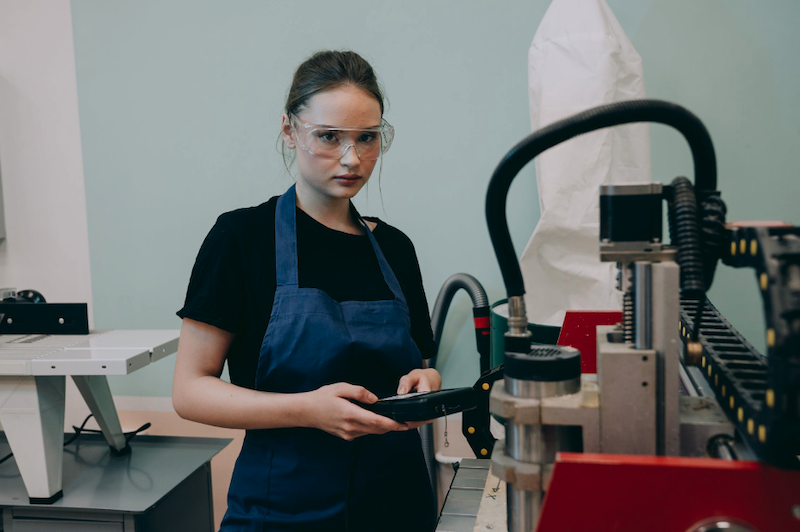The Impact of CNC Machining Across Industries
In the realm of modern manufacturing, few technologies have been as transformative as computer numerical control (CNC) machining.
This method, where computer programming guides the movement of factory tools and machinery, has revolutionized how we produce everything from everyday items to complex components.
Its journey from the earliest numerical control systems to today’s sophisticated multi-axis CNC machines encapsulates a saga of innovation and technological advancement.
As industries from aerospace to healthcare continuously evolve, CNC machining stands as a pivotal force driving this change, enabling unparalleled precision, efficiency, and versatility in production.
At the outset of exploring CNC machining’s vast landscape, it’s crucial to acknowledge the significance of choosing an exceptional prototyping shop.

The right partner in sourcing rapid prototypes and custom parts can dramatically influence the trajectory of product development, impacting everything from design fidelity to market readiness.
In this post, we’ll traverse the diverse industries shaped by CNC machining, uncovering its indispensable role in modern manufacturing and design.
Aerospace Industry
The aerospace industry demands the utmost precision. It’s not merely a standard to uphold; it’s an essential factor for ensuring safety and achieving optimal performance. CNC machining meets these demands head-on.
This is especially true in creating aerodynamic parts where even a micron’s deviation can affect performance. It’s instrumental in manufacturing critical aircraft components, from engine parts to structural elements.
The precision of CNC machining ensures that these components can withstand extreme conditions and stresses.
Moreover, advancements in materials, like lightweight alloys, are being harnessed more effectively thanks to the precision and versatility of CNC machines.
These developments not only reduce aircraft weight but also increase fuel efficiency and payload capacity. This synergy between material science and machining technology is pushing the boundaries of aerospace design and capabilities.
Automotive Industry
The automotive sector is another domain where CNC machining has made a substantial impact, so much so that almost more than 40% of the industry is availed by automotive industries for manufacturing different automotive parts.
CNC’s ability to rapidly produce complex parts allows for testing and refinement in the design phase. The automotive industry demands rapid production and high precision, and CNC machining provides both.
From complex engine components to intricate suspension systems, CNC machines produce parts with the utmost accuracy and consistency.
This has led to improvements in production efficiency, reducing costs and time-to-market for new vehicles. The ability to rapidly prototype also enables manufacturers to explore more innovative designs and solutions, fostering a culture of creativity and technological advancement.
Healthcare Industry
In healthcare, the impact of CNC machining is profoundly personal. It’s central to the creation of custom medical devices and implants tailored to individual patient needs. The precision of CNC machining allows for the customization of implants to fit the unique anatomical structures of patients.
These applications require not just precision, but also biocompatibility – a challenge CNC machining meets with finesse. It also ensures the high level of surface finish necessary for medical implants, reducing the risk of infection.
The technology’s ability to work with diverse materials, including medical-grade metals and plastics, has accelerated medical innovations.
This versatility is essential in creating devices that are durable yet compatible with the human body. From bespoke dental implants to orthopedic devices, CNC machining is at the heart of medical advances that improve patient outcomes and quality of life.
Consumer Electronics
CNC machining is pivotal in the consumer electronics sector, especially in shrinking and refining the design of components.
With electronic devices becoming tinier and more intricate, the necessity for meticulous engineering grows increasingly critical. The ability to precisely machine small, intricate parts is essential in the era of wearable technology.
CNC machining allows for the creation of intricate parts that are essential in today’s compact and high-functioning devices. This capability not only impacts the functionality but also the aesthetics of consumer electronics, enabling sleeker, more appealing designs that resonate with consumers.
Energy Sector
The energy sector, particularly in renewable energy, has also benefited from CNC machining. The technology is vital in manufacturing equipment like wind turbines and solar panels.
In these applications, precision is key to efficiency and performance. CNC machining facilitates the creation of components that maximize energy capture and conversion, contributing significantly to sustainable energy solutions.
The production of high-efficiency photovoltaic cells for solar panels highlights the importance of this. As our reliance on renewable energy sources intensifies, the significance of CNC machining in crafting dependable, high-performance energy solutions becomes increasingly paramount.
Final Thoughts
CNC machining has undeniably left its mark across various industries. From aerospace to energy, it has been a catalyst for innovation, efficiency, and precision. Looking ahead, the ongoing advancement of CNC technology heralds even more remarkable developments.
It transcends the capabilities of the machines themselves, encompassing the expertise and quality inherent in each component they create. As CNC machining progresses, its influence is set to expand, profoundly shaping our approaches to manufacturing and design in the future.

